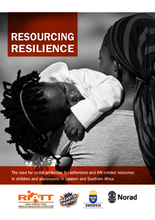This report includes a literature, evidentiary, and policy review of social protection in the Eastern and Southern African Region. According to this report, an estimated 1.2 million HIV-positive children and adolescents live in the Eastern and Southern African region. Most of these children face struggles in maintaining antiretroviral therapy adherence and receiving HIV-related services. In the literature review, there is a recognition of the tremendous amount of resilience found in HIV-infected children and adolescents as they negotiate and navigate support. This report stresses the need for child-sensitive policies and programming stating that providing these policies would help children and adolescents adhere to treatment plans and live healthier lives.
There is an in-depth discussion of social protection and the many working definitions. It further discusses the need to provide social protection to children and how it helps to address issues of poverty. This report emphasizes the benefit of social protection and discusses the positive aspect of social cash transfers. The report states that using these tools in combination have a greater potential for improving health outcomes for HIV-affected children and adolescents. The report discusses how in the context of social protection, there are points of contention when considering whether programmes should target individuals or families exclusively based on HIV-positive status or whether these programmes should be more inclusive. UNICEF recommends HIV-inclusive social protection, which is sensitive to HIV, including people who are either at risk of HIV infection or vulnerable to HIV consequences.

